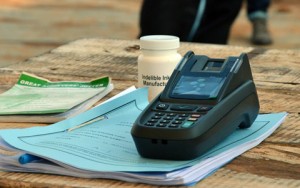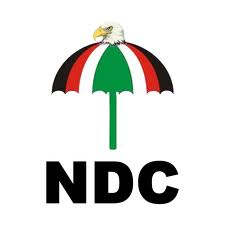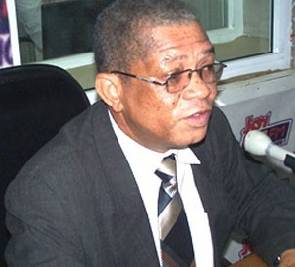 On Thursday, June 5, 2014, the Chairman of Ghana’s Electoral Commission, Kwadwo Afari-Gyan, took a potentially dangerous and indefensibly stubborn position by insisting that the electoral management body would not bow to pressure from political parties and civil society groups to commission an independent audit of the biometric voters’ register.
On Thursday, June 5, 2014, the Chairman of Ghana’s Electoral Commission, Kwadwo Afari-Gyan, took a potentially dangerous and indefensibly stubborn position by insisting that the electoral management body would not bow to pressure from political parties and civil society groups to commission an independent audit of the biometric voters’ register.
To him, there was no evidence that the register was bloated or not credible.
Looking cursorily at Ghana’s 2012 voters’ list, having 56.2% of the population certified as eligible voters, may appear pretty normal. But, the picture becomes evidently disturbing upon closer scrutiny of the statistics and when compared to figures across the globe. What comes out is that Ghana has one of the most abnormal, if not the worst, electoral roll in the entire world. It is certainly the worst in democratic Africa.
This is because a nation cannot simply have a higher number of electorate than the number of people eligible (by age and other criteria) to vote. In Ghana, like in many other countries, you have to be 18 years of age, of sound mind and a citizen to vote.
Yet, figures from both the Ghana Statistical Service and the Electoral Commission show, beyond doubt, that Ghana’s voters’ register has far in excess of the number of people eligible to vote.
In 2012, when the data was eventually released, the national census estimated Ghana’s total population, including foreigners, to be 24,965,816. That year, a new electoral list was compiled by the EC, capturing for the first time, biometric data. 14,031,763 people (or names) were registered to vote in the 2012 general elections, representing 56.2%.
Even if one opts for the government statistician’s revised population estimate of 25,235,268 people at the beginning of 2012 when the registration process started, this would still leave one with 55.60% of the population being cleared to vote.
Why this figure was not immediately seen as curious by the EC is odd. In 2009, not only had the EC Chairman criticised the register used for the 2008 elections as “statistically impossible by world standard” for having 13 million on the list, moreover, the official census statistics in 2012 suggested it was not possible for a presumably cleaner, biometrically ‘de-duplicated’ voters’ register to have one million more names than the previous, bloated one.
Median Age
It was not for nothing that the Danquah Institute demanded, albeit without success, for the 2010 census figures to be made available before the voter registration exercise began. What we feared might happen is what is now believed did happen.
The irrefutable evidence of a bloated register can be found at the Ghana Statistical Service. The body that undertook the national census put the median age of Ghana at the time at 20.8. The median age is the age that divides a population into two numerically equal groups – that is, half the people are younger than this age and half are older. It is a single, credible index that summarises the age distribution of a population. See Table 1 below.
Thus, per the last census, half of Ghanaians were, roughly, above 21 years old and the other half below 21. However, the 2012 list of registered voters tells us something arithmetically illogical, deviant and suspicious. It tells us that 56.2% of Ghanaians were entitled to vote! Furthermore, the census, as indicated in Table 1, tells us that 49% of Ghanaians were in the age bracket of 0-19.
Indeed, it is often the case that countries, especially where voting is not compulsory, tend to have a lesser number of their population eligible to vote actually going ahead to register to vote. But, remarkably, Ghana defies this norm.
The anomaly is obvious even before taking into account the fact that possibly between one million to three million of the people captured by the population and housing census of 2010 would not have been Ghana nationals. Again, the immigration service estimates that 82% of foreigners in Ghana are Africans, with a majority of them (some 60%) migrating from neighbouring West African countries.
For emphasis, let me reiterate the point. Since one has to be 18 and Ghanaian to be allowed to register to vote and half of the total population of Ghana (including Ghanaians and non-Ghanaians) were, by the census, shown to be below the age of 21, it could never have been possible for the EC to have captured more than half of the population on its register as the people with the constitutional right to vote in Ghana.
Independent Audit
Yet, the EC, which saw nothing wrong with the register then, continues to maintain today, after all the embarrassing problems that were exposed in court during last year’s sensational election petition case, that there is no case for an independent audit of the roll.
It must be noted that the evidence of double registration, which the petitioners produced in the course of the trial, without rebuttal, became apparent merely from analysing a sample of the 14 million entries in the PDF files supplied to the political parties. Those who did that tedious limited analysis, notably, had no access to the biometric profiles of the people captured on the electoral roll.
To date, there is no independently verifiable evidence that the EC and its contractor, STL, undertook a credible de-duplication of the 2012 electoral roll. The little evidence in court proved otherwise. What the evidence in court showed was that STL’s AFIS (automated fingerprint identification system) did not work. What is required now is for an open, international tender for a credible NIST-certified AFIS company to undertake this important audit and in the presence of technical agents of all the political parties.
It is difficult to appreciate why the EC would want to take such a hard line position against calls for an independent audit. It is potentially dangerous because the last thing Ghana wants is to approach the 2016 general elections with a thick cloud of suspicion over the base document for the polls.
2016 is a contest that has to be determined at the polling station, and not in court, and for that to be done to the reasonable satisfaction of all stakeholders, every necessary step must be taken to enhance the credibility of the process.
Even the Supreme Court, which dismissed the election petition by a 5:4 majority, acknowledged the need for reforms of the electoral process. Already, the political parties have identified the electoral roll as one of the problematic areas to be addressed. So why fight it, Dr Afari-Gyan?
What a proper independent audit would do is to analyse and verify the register’s actual biometric data for a transparent and credible de-duplication exercise to be done. The voter registry itself can be audited by running computer checks for duplicate entries and anomalies concerning names and numbers. It can, moreover, be done to tease out over- or under- representation of segments of the population by age, gender or geographic locations, and the registry can be checked. In addition, statistical samples can be used to check the accuracy of entries on the list (“list-to-people” verifications).
Ironically, the 2012 biometric registration was deliberately done, at great cost, to give Ghanaians a more credible electoral roll. Sadly, it ended up being the one voters’ register containing the highest percentage of the population in Ghana’s history. For the Fourth Republic alone, Ghana’s voters’ register had ranged from 46.30% of the population in 1992 to 54.50% in 2008, before going up to a record 56.2% two years ago.
Youth Bulge
Ghana’s median age of 20.8 offers more than enough prima facie evidence in exposing the integrity deficit of the current electoral roll. The table below, compiled by the Danquah Institute, tells the story better. Africa is known to have the youngest population globally, having to cope with the youth bulge phenomenon. The developed world, on the other hand, has the problem of an ever-aging population.
The United Kingdom, for instance, boasts of a median age of 40.5. It is, therefore, not strange to find 73.13% of UK’s 62 million population on its electoral roll. Moreover, in the UK, unlike Ghana, you do not have to be a British citizen to vote. To be eligible to register to vote, a person domiciled in Britain must be aged 16 years or over (but you cannot vote until your eighteenth birthday), and a British, Irish, EU or qualifying Commonwealth citizen.
In Africa, South Africa, which has a relatively high median age of 24.7, has one of the highest voter populations on the continent. Yet, it could only capture less than 48% of its 53 million population on its electoral roll. Tanzania, with a median age of 18.3, has 42.5% of its 48 million people registered to vote.
Kenya, which, like Ghana, compiled a new register in 2012, using biometric technology, registered 14.36 million, or 34.5%, of its 41.6 million people. Kenya’s median age is 18.7. In fact, Ghana, where the population is little more than half that of Kenya, is telling the world that it is ok for it to have the same number of registered voters as the bigger East African nation.
The belief in Kenya is that the introduction of biometric technology helped to clean their electoral roll of multiple registration. The country’s electoral role for the disputed 2007 race had 14,293,728 names (similar to the 2012 register), from a total population at the time of 36,913,721.
Closer to Ghana, Nigeria, which has a median age closer to Ghana’s at 19.1, managed to capture 41.7% of its population from its biometric registration exercise. Senegal, with a median age of 18.7, has 41.5% of its 12.76 million people on its electoral roll. Why should Ghana be the only odd one out?
After the 2008 election, the head of Ghana’s election body blamed the bloated register on three main illegalities: multiple registration, registration of minors and non-citizens of Ghana, who are not eligible to register to vote. Added to that, were the names of dead people remaining on the register.
A voters’ register must meet the performance measures of currency, accuracy and completeness in order to pave the way for free and fair elections. The integrity of Ghana’s crucial 2016 leadership contest would be a non-starter without basic public confidence in the voters’ list.
The author is the founder of the Danquah Institute, the think tank that led the campaign for biometric voter registration and verification in Ghana.
Table 1: Comparative Voter Registers, Populations and Median Age,
|
Country |
Voter Register |
Population |
%age |
Median Age |
|
Ireland |
3,202,442* |
4,670,976* |
68.6% |
35.4 |
|
United Kingdom |
45,597,461* |
62,348,447* |
73.13% |
40.5 |
|
Kenya |
14,362,189 |
41,609,728 |
34.5% |
18.8 |
|
Ghana |
14,031,763 |
24,965,816 |
56.2% |
20.8 |
|
Nigeria |
67,764,327 |
162,470,737 |
41.7% |
19.1 |
|
Senegal |
5,302,349 |
12,767,556 |
41.5% |
18.7 |
|
Tanzania |
19,650,412 |
48,261,942 |
42.5% |
18.3 |
|
South Africa |
25,390,159 |
52,914,243 |
47.9% |
24.7 |
|
Cote d’Ivoire |
5,780,804 |
21,058,798 |
27.45% |
19.4 |
*Ireland and UK figures are for 2011
Source: Danquah Institute






